|
|
|
Sort Order |
|
|
|
Items / Page
|
|
|
|
|
|
|
| Srl | Item |
| 1 |
ID:
087710


|
|
|
|
|
| Publication |
2009.
|
| Summary/Abstract |
Empirical evidence supports the poliheuristic (PH) theory of decision making, which states that leaders typically employ a two-stage non-compensatory decision-making process. In stage one leaders reject options that do not meet some minimum criteria of acceptability on one or more dimensions, and in stage two they choose among the remaining options using a more rational utility-maximizing rule. While PH theory has primarily been applied at the monadic level, to explain the process and content of states' decisions, we contend it has important implications for strategic interaction and can help to explain outcomes in world politics. Specifically, we argue that a crucial variable shaping crisis outcomes is the degree to which leaders' non compensatory decision criteria in stage one include options' acceptability to the opponent. When leaders empathize with their opponent and screen out those options the opponent considers unacceptable, crises will be resolved more quickly and with a lower likelihood of escalation. Empathy introduced during the second, utility-maximizing stage, may also dampen conflict but is less effective than stage one empathy. We illustrate this dyadic non compensatory model by examining two cases involving the U.S.-China and U.S.-Iraq bilateral relationships.
|
|
|
|
|
|
|
|
|
|
|
|
|
|
|
|
| 2 |
ID:
087730
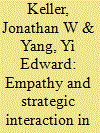

|
|
|
|
|
| Publication |
2009.
|
| Summary/Abstract |
Empirical evidence supports the poliheuristic (PH) theory of decision making, which states that leaders typically employ a two-stage non-compensatory decision-making process. In stage one leaders reject options that do not meet some minimum criteria of acceptability on one or more dimensions, and in stage two they choose among the remaining options using a more rational utility-maximizing rule. While PH theory has primarily been applied at the monadic level, to explain the process and content of states' decisions, we contend it has important implications for strategic interaction and can help to explain outcomes in world politics. Specifically, we argue that a crucial variable shaping crisis outcomes is the degree to which leaders' non compensatory decision criteria in stage one include options' acceptability to the opponent. When leaders empathize with their opponent and screen out those options the opponent considers unacceptable, crises will be resolved more quickly and with a lower likelihood of escalation. Empathy introduced during the second, utility-maximizing stage, may also dampen conflict but is less effective than stage one empathy. We illustrate this dyadic non compensatory model by examining two cases involving the U.S.-China and U.S.-Iraq bilateral relationships.
|
|
|
|
|
|
|
|
|
|
|
|
|
|
|
|
| 3 |
ID:
052898
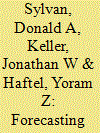

|
|
|
| 4 |
ID:
133584
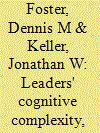

|
|
|
|
|
| Publication |
2014.
|
| Summary/Abstract |
Some scholars have suggested that when faced with domestic political problems, leaders employ simplified decision processes, preferring action to deliberation and highly visible diversionary uses of force to alternative policies. Others contend that domestically embattled leaders will pursue a more rational examination of the costs and benefits of various options-the sort of deliberation that will lead them to reject diversionary force in favor of less risky measures. Drawing on research in political psychology, we argue that leaders' cognitive processes are not constants but variables, and that both models are correct under certain circumstances. Leaders low in conceptual complexity (CC), and especially those with hawkish leanings, will pursue simplified decision-making procedures and embrace diversionary strategies, while leaders who are high in complexity will pursue a more thorough consideration of risks and alternatives and generally avoid diversionary actions. We examine these expectations by testing the interactive effect of economic misery and leaders' CC on American force usage for the period 1953-2000. The findings indicate that more conceptually simple leaders-particularly when high in distrust, a trait linked to more hawkish policy inclinations-are significantly more likely to engage in diversion.
|
|
|
|
|
|
|
|
|
|
|
|
|
|
|
|
| 5 |
ID:
133583
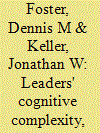

|
|
|
|
|
| Summary/Abstract |
Some scholars have suggested that when faced with domestic political problems, leaders employ simplified decision processes, preferring action to deliberation and highly visible diversionary uses of force to alternative policies. Others contend that domestically embattled leaders will pursue a more rational examination of the costs and benefits of various options-the sort of deliberation that will lead them to reject diversionary force in favor of less risky measures. Drawing on research in political psychology, we argue that leaders' cognitive processes are not constants but variables, and that both models are correct under certain circumstances. Leaders low in conceptual complexity (CC), and especially those with hawkish leanings, will pursue simplified decision-making procedures and embrace diversionary strategies, while leaders who are high in complexity will pursue a more thorough consideration of risks and alternatives and generally avoid diversionary actions. We examine these expectations by testing the interactive effect of economic misery and leaders' CC on American force usage for the period 1953-2000. The findings indicate that more conceptually simple leaders-particularly when high in distrust, a trait linked to more hawkish policy inclinations-are significantly more likely to engage in diversion.
|
|
|
|
|
|
|
|
|
|
|
|
|
|
|
|
| 6 |
ID:
076696


|
|
|
| 7 |
ID:
083749
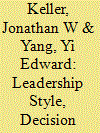

|
|
|
|
|
| Publication |
2008.
|
| Summary/Abstract |
The poliheuristic (PH) theory of decision making has made important contributions to our understanding of political decision making but remains silent about certain key aspects of the decision process. Specifically, PH theory contends that leaders screen out politically unacceptable options, but it provides no guidance on (1) the crucial threshold at which leaders reject options as politically unacceptable, (2) whether this threshold varies across leaders and situations, and, (3) if so, which factors shape variation in this threshold. We integrate PH theory with research on political leadership and decision context and derive hypotheses from this modified PH framework. An experimental test reveals that situational context and leadership style affect both (1) the ``noncompensatory threshold'' at which decision makers reject options as politically unacceptable and (2) how much decision makers rely on their constituents' views in making policy choices. We conclude that a modified PH theory incorporating these insights will have enhanced explanatory and predictive power.
|
|
|
|
|
|
|
|
|
|
|
|
|
|
|
|
| 8 |
ID:
061756


|
|
|
| 9 |
ID:
136175


|
|
|
|
|
| Summary/Abstract |
The article “Virtual Worlds Can Be Dangerous: Using Ready-Made Computer Simulations for Teaching International Relations” reports on one class's experiences with the Statecraft simulation. Students reported confusion regarding the simulation rules, questioned its utility as a teaching tool, and found that Statecraft was unrealistically prone to cycles of violence including nuclear war. However, the article makes no mention of the fact that Statecraft was used in this classroom in ways that directly contradicted its explicit instructions. These instructions were designed to maximize Statecraft's pedagogical effectiveness and prevent precisely the sorts of negative outcomes this class experienced. Specifically, the simulation was not properly set up before Turn 1, students were not incentivized to learn the simulation rules, the all-important grading system appears not to have been used, and the instructor materials that are essential for helping students make sense of their Statecraft experience are nowhere mentioned in the article and appear not to have been used. This brief response highlights the most important features of the Statecraft design and pedagogical intent that were entirely absent from this article, so that readers may gain a more complete picture of what Statecraft was intended to do and how it is designed to work.
|
|
|
|
|
|
|
|
|
|
|
|
|
|
|
|
|
|
|
|
|